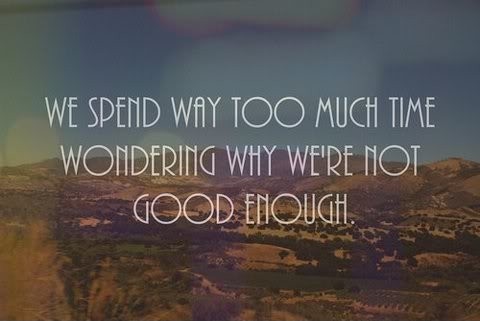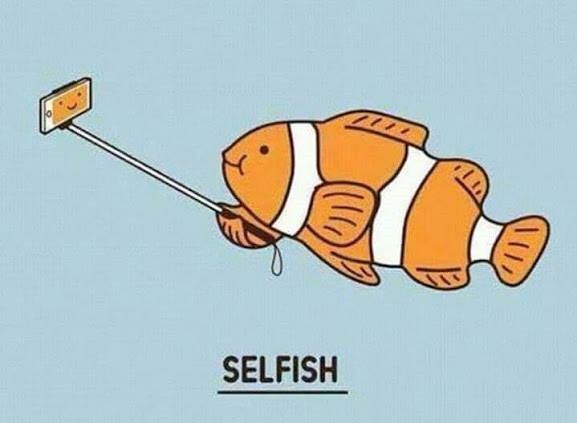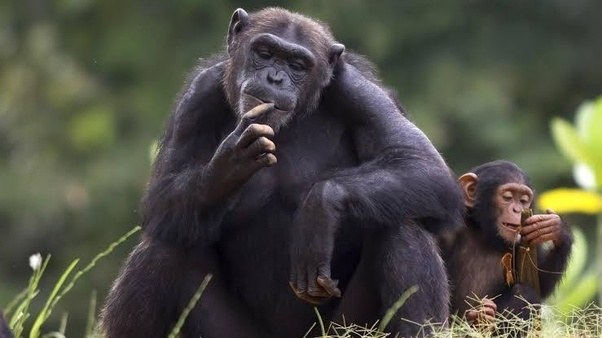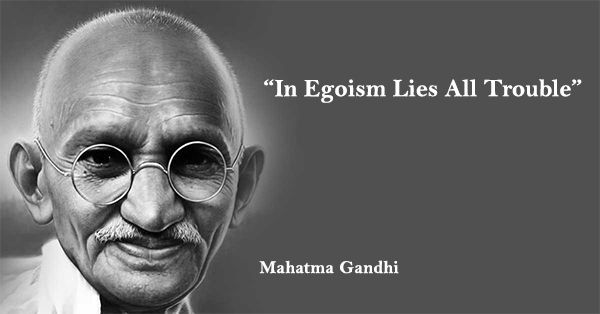Be Good Enough
Many times and perhaps all my life I walk around with the feeling that I am not good enough. That no matter how many people I help, how much I will try to be supportive, contains, happy, it is not enough. I will never be a good enough son. A good enough partner. A good enough person. Where does this feeling come from? And is it possible to change this belief?
I went to "investigate" whether this problem exists only in my head or I'm not alone in the world. Most of the posts I read here deal mostly with these questions.

Image Credit
We are constantly acting in terms of punishment and retribution, criticizing judgment and accusations against the world and others, all in order to prove to ourselves that we are good enough, that if the others are less good than us, then maybe we are all right. Or if we excel in business, studies, art - then we are good. But if you suddenly go weaker, then no longer ...
It is possible that all human violence story is basically inferiority of the man who feels unable to provide the woman, and in an attempt to impress her, he tries to prove his superiority in ways that aggression and violence.
This may be a quite broad generalization of all the kinds of violence that exist today in our culture, but I certainly agree with this definition, at its deep level.

Suppression Of Men
As a man, I am depressed in several ways:- I have to prove my value through work and livelihood. If I do not work or support,
I am not worthy of being a husband, a father, or a man. I'm worthless. - I must show the woman that I am successful and successful in conquering her.
Women love successful men. If I can not, I'm probably not good, and I do not deserve a good wife. - I have to be the master of a woman (a more conventional view of traditional societies, less of Western societies in our generation, but still present), and make sure she does not do things she should not (flirt with other men, disrespect me, show independence).
- I must not show emotion. Emotions are a sign of weakness, of childishness. Crying is forbidden in public. The men cry at night or on the side.
- I have to be the protector and warrior, and as such, I am supposed to kill other men (but not women, children and the elderly). That's how it was from the dawn of time, there's nothing to do, it's the nature of man and men.
These cultural oppressions are already deeply rooted in our culture (human culture).
And at their base is the assumption - we are not good enough.

Image Credit

Are We Good Enough?
Our perception of ourselves as separate creates the illusion that we are not good enough. If I say goodbye to all the others around me, and the world is a competitive place, I have to prove myself, because otherwise, I will not be good enough. I must overcome all my weaknesses and all the bad sides, educate them and manipulate them, overcome the addictions, erase the selfishness, and then I will be a good person.Our destructive culture is built on a struggle between good and evil, we are the good ones - against those who are not good enough - the bad ones. Everyone has his bad guys, those who are not good enough. Those who act out of power or greed or simply stupid.
If instead of beating the bad guys, we will seek to heal, perhaps we will find that healing is healing of ourselves. The separate self-wants to heal through connection, not through submission of evil, of the evil parts within us. Our healing demands the opposite: self-acceptance, self-love, and self-confidence. In contrast to our best intentions, we will never eliminate the evil and violence of our culture by trying to overcome, regulate, and control a human nature that we think is evil.
The war in human nature, no less than our war on nature itself (through the attempt to engineer and control it), we will create only more separation, more violence, more hatred.

Violence cannot be won with violence. Also in the internal sense. I can go to war against parts of myself that I think are bad, but even if I win, the victors become the new villains. I win myself, but I do not become whole. Instead, I project my dominion toward myself, out on the world.
Yes, of course, self-acceptance. . . The idea is more or less a cliche these days. But the full expression of self-acceptance, self-love, and self-confidence is absolutely radical and challenges many doctrines of how to be a good person.
How can it be?
Is not it exactly the selfishness and greed that put us into this mess in the first place?

To Be Truly Selfish
Perhaps what we see as selfishness stems from a false representation of the self. Our cultural assumptions about who we are, reinforce the illusion that we are separate. That my self is separate from your self. And that the good parts of me are separate from the bad parts.Today a new understanding of self-arises, selfishness is interpreted as something completely different. The selfishness that strengthens the good within me, whose premise is that we want to do good, with ourselves, and therefore with the world, because we are not separate.
The desire to do evil is the desire to control and eradicate evil, to destroy the Jews, to destroy the Muslims, to castrate the men, to train the women and children, to domesticate the animals. It is precisely the release of the control of the selfish impulses that is the key to creating the desired unity.

Image Credit
But then what, we'll sit in the house, eat sweets, get scared on TV, and pay the slaves to do all our work?
To be good to ourselves, to understand that just as we are enough, to love ourselves, it is perhaps the most radical thing we can do nowadays. How to begin? You can say it out loud laughter or ridicule may arise, especially if you do it in the presence of other people), you can touch yourself with a loving touch, you can pamper our selves with sweets or other material pleasures, you can thank our selves for the difficulties, pain, and suffering we sometimes experience And to understand that this is part of life. We can allow ourselves to cry If we like...

History Of Mankind
Since the dawn of history, humankind has adopted a culture-based survival strategy: an agreed system of beliefs, values, procedures, rituals, and symbols that underlie the way people conduct their social connections. The place of the individual has largely defined culture, and this has changed with the change in the challenges posed to mankind. If in the savannah of Africa one hundred and fifty years ago it was impossible to survive physically without belonging to the tribe, today social belonging meets other needs, mainly psychological. Indeed, if we try to define an individual, we will find that we can not do so except by relating to others, members of the group to which he belongs. Among many mammals, the distinction between the individuals in the group is obtained through the hierarchy in the social structure and is particularly prominent in the primate population, among which are some of the species closest to us.Various naturalists recognize social behavior in many other species, some of them very far from us at the level of their development. Wolves share their food fairly with other wolves and rely on close wolves in raising their offspring. Among horses, elephants, hyenas, and dolphins you can also see many friendships. One study found social behavior, almost human, among 120 Collie dogs, even higher than that known to nature's great collaborators: chimpanzees.
As early as the beginning of the twentieth century, psychologist Alfred Adler suggested that the basic need for belonging had evolutionary and developmental advantages. He also estimated that the central motivation for our activity was social (and not necessarily sexual, as Freud had predicted) and that the need to belong was a deep human need. Adler's theories have recently been positively echoed in the work of two animal behavior researchers at the University of Pennsylvania. Dorothy Cheney and Robert Separate challenged the traditional Darwinian assumption that the aggressive, the competitive and the dominant species of species had more offspring. The two conducted a study of the social behavior of baboons and examined the social habits of 90 monkeys in Botswana for more than 15 years. Their work was summed up in a fascinating book, in which they determined that the main predictor of the fertility of female baboons (the number of offspring) is the intensity of the social connection between these females and other females in the tribe. In addition, they found that the survival rate of the offspring of females with developed social connections was also higher, as was their life expectancy.

Image Credit
For the sake of the scientific heritage, the two also did not hesitate to dirty their research hands and examined the female droppings in an attempt to trace substances secreted from the body - which usually appear as a result of stress and stress. The death of a relative of the tribe caused a higher incidence of these substances in the dung. But it soon became clear to the researchers that after such a disaster, the females formed social relationships with new females and signs of distress were lost. Even natural selection seems to favor baboons who develop social connections within and outside the family.
In another study, the level of oxytocin (the hormone of cooperation known as the "trust molecule") among chimpanzees who spend their time in lice clearing other chimpanzees is similar to that of the high hormone that causes the presence of close relatives.
Towards the end of the 19th century. The traditional connection between people and their land and the small community that were part of it gave way to the new possibilities brought about by industrialization, but also to the alienation created by the accelerated process of urbanization. While in the first form of life people derived most of their psychological well-being, as well as the source of their identity and even their self-esteem from belonging to the group, in a slow but steady process we have now reached a situation in which people derive their psychological sense of well-being and self-esteem from their personal and unique qualities and personal achievements.
It is interesting to find out what happened on the way - from the 19th-century rural society to today's individualistic society. In an interesting coincidence, these years coincide with the development of the science of psychology, and since Adler introduced his theory, many behavioral scientists have had to express their learned opinion about the important connection between the individual and the society.

The Social Point Of View
The social perspective that completes the balance of forces in this equation is revealed in an unpublished study, in which it was found that the group also has an advantage when there is a distinction between its individuals. This advantage is lost when the individuals in the group lose their identity and merge into a group with one homogenous identity.That is, the company, too, and not only the individual grows advantage when the "elusive balance point" is in the right place.
He conducted the study with colleagues, one of the most prolific researchers in behavioral sciences (More than 500 articles To this day): Roy Baumeister of the University of Florida.
In an article he wrote in 1995 with Mark Leary of Duke University, titled "The Need to Belong: The Desire for Interpersonal Communication as Key Human Motivation," the authors state that people whose relationships with the environment are underdeveloped and their sense of social belonging do not provide behavioral and health-related deadlines.
"A large part of social behavior can be explained by the basic need to belong," they write. In their founding paper, the two argue that this need is more important than many other possible motivations, and is at the center of our thoughts, emotions, and behavior. In our opinion, much of our anxieties stem from fear of rejection and social isolation.
Baumeister and Leary's study received special attention, reflecting the interest of the research community on the new grounds. Their work was based on sociology, anthropology, political science, and of course on psychology.

I recently saw a BBC documentary trying to explain the phenomenon described here.
The film describes how the elite in the United States used Freud's theories to glorify the "self" and how it reaches the areas of consumerism and politics.

Egoism is A Normative
Egoism is a normative concept, culture-dependent and difficult to measure. Therefore characterizing the behavior and lifestyle of an entire generation in such terms seems problematic from the start. Not only is it difficult to attach rigid indices to egoism-altruism, but we do not have the historical and cultural comparison tools that will enable us to empirically assess the change and determine whether this generation is more selfish than its predecessors.8 From a historical point of view, it is almost impossible to answer this question. Not only did they not measure this dull and fluid variable in the past, but many of the behaviors we see today as selfish have been perceived as legitimate and even positive.However, as a result of the accumulated experience in the behavioral sciences, it is possible to chart a certain sequence of tendencies and orientations related to internal or external focus. In other words, cumulative evidence can be presented about the strengthening of internal focus and the weakening of external focus in various areas of our lives. Moreover, scientific experience shows that it is possible to locate structures and social mechanisms that strengthen or weaken these foci. Because human behavior is based on social norms and powerful social mechanisms, one can accept the assumption that a generation that grows in a social environment that grants greater legitimacy to personal freedom and demands less co-existence and sacrifice will develop a lifestyle and worldview accordingly.

Simple egoism can be treated as the tip of the inner focus. August is a person who meets his needs and desires in the center of the world, regardless of the needs and desires of the community. Egoism is often expressed in demands, greed, and inability to curb immediate impulses and to maintain a fair partnership. The word egocentric often replaces the word egoistic, especially when the emphasis is not only on social behavior but on perception and the way society is viewed. In other words, an egocentric person is a person with a narrow point of view, blind to the needs, feelings, and points of view of those around him. Egoism is expressed, inter alia, in evading responsibility and fulfilling roles, not out of laziness, but out of exploitation and personal interest.
The opposite trait of egoism is altruism, and it expresses the giving and devotion to the other, consideration of others without consideration and personal benefit (at least without conscious benefit) in the name of a moral ideal.
Extreme selfishness, which involves excessive preoccupation with oneself, is perceived as the narcissistic personality disorder ("narcissism"). The narcissist is concentrated and self-absorbed, a kind of constant attention and social reinforcement. In fact, narcissists are people who suffer from a lot of self-love, that is, need others to assert their identity, while requiring exclusive attention. They are unable to empathize with the environment or to have close relationships unless they satisfy their personal needs.
This term comes from a fairy tale about a handsome Greek prince named Narcissus, who fell in love with his reflection from the swamp and could not break away from it until he died. A man in love with himself is called "Narcissi"
It is important to emphasize again that in complex and dynamic human reality, egotism, egocentricity, and narcissism, like any other human trait, cannot be classified according to black and white categories, but rather on a continuum of culturally dependent levels and characteristics.

It was not by accident that faith developed selfishly. No one has taught us to identify and improve our emotional skills, and in emergencies, we use our basic instinct ('fight or run'), an existential instinct that was appropriate for the times when we had to deal with wild animals.
The basic instinct paralyzes most systems in our body, allowing us to react to every sense of threat with great violence, to save our lives. In the twenty-first century, we do not encounter predator animals and we do not need the basic instinct, but we continue to use it as long as we have not developed our dormant emotional skills.
Overuse of the basic instinct increases our sense of anxiety, causes stress that affects our physical systems and shortens our lives. The basic instinct makes us interpret each encounter as a danger, and in response, we invest most of our resources in defense systems (walls and alarm systems, countless insurance plans, weapons and security budgets) and get into many confrontations with those around us.
But that does not mean that we have completely neglected our emotional skills. Despite selfishness, empathy allowed the development of civilization and the collaboration that allowed the establishment of advanced transport and communications systems, scientific discoveries, and social agreements.
We overuse our basic instinct, but we also have the opportunity to develop our emotional skills and create a world of sharing. Human nature is indifferent to both possibilities, and the choice is in the hands of each of us.
Is the world going to become a world of co-existence, in which we relinquish violence and preserve nature, or will the conglomerates become even more powerful and control us in more sophisticated ways? Everyone seems to have the choice. I believe that emotional coaching provides tools for anyone who chooses a culture of sharing.
Every encounter we have with ourselves, with others and with the reality in which we live is a bridge that we cross. The emotional skills allow us to pass through it safely and create a better world.





Until next time, thank you for visiting @nirgf
Feel free to leave a comment below!
We are good enough. Happy Holiday!

Merry Xmas @robertchr
Thank you
You are good enough ;)
Perfect Post!
Thank you for visiting,
Well, you "live" close :)
Why do you need to conquer women. Isn't living with them enough?
It's not just a post about me, I've also written about an existing situation :)
Got it.🍌
as a woman i tell we have to selfish some time to save our belongs and beloved ones
I totally agree with what you say - as a man :)
I have no idea why would you think so, but I am pretty sure it is not a question of the belief.
Most often, the people think that helping only one person is not enough, but there they are wrong.
Because, changing a destiny of one person, may influence a plethora of the things which are only superficially not connected.
All things listed under suppression are kind of a normative, but they are only the ideological constructs, nothing of it is real.
We can't influence things out of our reach or commend. The things we can, are the one within us.
About the rest mentioned in the text ...
A person naturally born with a huge ego, will analyse from inside out, from own perspective towards other people ( you can't truly understand another, if you can't understand yourself), but one who is truly selfish, will not analyse at all.
Just my opinion.
It took me some time to think about what you wrote here.
I understand what you're saying - I agree with you @aschatria
Very clever interpretation
Lovely and creative! ♥
and yeah many believe people don't kill each other because of the law, I believe a place like America was the second chance to humans and the american creators showed they can do better.
(Don't mistake my word for approving the current situation in there!)
Excellent series, which speaks exactly about what you wrote Designated Survivor
Pretty long, but awesome read.👍🏻
Yes, I am aware of this,
It happens to me many times, I do not know how to finish,
There are so many topics that interest me ...
Thank you so much for reading my long post
This post has received a 2.80 % upvote from @buildawhale thanks to: @nirgf. Send at least 1 SBD to @buildawhale with a post link in the memo field for a portion of the next vote.
To support our daily curation initiative, please vote on my owner, @themarkymark, as a Steem Witness